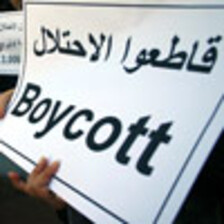The Electronic Intifada 9 November 2009

Palestinian activist Mohammed Othman. (Stop the Wall)
At the beginning of September, Finance Minister Halvorsen announced Norway’s divestment from the Israeli company Elbit due to “ethical concerns.” Elbit provides security systems for Israel’s wall in the West Bank and illegal settlements as well as unmanned aerial vehicles (commonly known as drones) and other technology for the Israeli military. According to many Middle East analysts and human rights groups, Othman played a pivotal role in Norway’s decision to disassociate from Elbit.
Norway’s severing of ties with Elbit is just one of the recent successes of the BDS campaign. The Africa-Israel Group, a company led by Israeli diamond mogul Lev Leviev which is involved construction of illegal Israeli settlements, has recently plummeted as investors have pulled out. While Africa-Israel’s recent decline has been due in large part to the global economic downturn, the attention of BDS activists has made associating with the company and its chairman politically unpalatable. Amongst those who have distanced themselves from Africa-Israel is the United Kingdom’s government. In March, the UK cancelled plans to move its Tel Aviv embassy into a building owned by the company.
The Israeli daily Haaretz reported on 6 September that Israel chose a subdued response to the news of Norway’s divestment from Elbit. But the continued detention of Othman seems to suggest that the Israeli government feels increasingly threatened by the BDS movement.
Arthur Nelsen, Middle East analyst and author of the forthcoming book In Your Eyes a Sandstorm, comments that “The Othman case indicates a fear of the BDS movement among Israel’s political and security elite, particularly when it has the ear of foreign governments.” Nelsen added that “Locking up nonviolent opponents suggests a stunning lack of confidence among Israel’s leaders in their ability to argue their case, still less win it. It bears all the hallmarks of an authoritarian campaign to silence nonviolent critics of the occupation.”
Othman’s imprisonment also highlights a government intent on punishing Palestinians who speak out in international forums. In a statement given to The Electronic Intifada, Addameer, a Palestinian prisoner support and human rights association, pointed to the July detention of Mohammed Srour as another example. Srour, 38, was detained at the Allenby Crossing on 21 July as he attempted to return to the occupied West Bank from Geneva, where he spoke before the United Nations Fact Finding Mission on the Gaza Conflict. In Geneva, Srour testified to the shooting deaths of two protestors who sustained their fatal injuries at a West Bank demonstration when Israeli soldiers opened fire on the crowd. Srour was held for three days in an Israeli military prison. After posting bail, he was released without charges.
In 2008, Gaza journalist Mohammed Omer was detained and beaten by Shin Bet (Israel’s internal security agency known as the Shabak) upon his return from a speaking tour in Europe, where he had been awarded a prestigious journalism prize for his coverage of the Israeli blockade on Gaza.
Othman’s high-profile story has also brought international attention to the plight of hundreds of Palestinian prisoners. There are currently 355 Palestinians being held in Israeli military prisons without trial, 29 of which have been held for as long as two to five years straight, according to a recent report by the Israeli non-governmental organizations HaMoked and B’Tselem. In almost all of these cases, the detainee is imprisoned on the basis of “privileged evidence” provided by Shabak. Neither the client nor the defense attorney has access to the evidence, thereby rendering them powerless to dispute Israel’s allegations.
Ironically, Israel’s attempts to silence Othman have only strengthened the voice of nonviolent resistance. Othman’s continued detention has gained sympathetic coverage from a variety of media outlets. In mid-October, a protest calling for Mohammed Othman’s immediate release was held in Manhattan, outside of the Madison Avenue jewelry store owned by Africa-Israel mogul Lev Leviev. The action, organized by the New York City based group Adalah-NY, brought publicity to both the BDS movement and Othman’s important place in it.
In a public statement, Adalah-NY’s Andrew Kadi commented, “Israel’s arrest of Mohammed Othman … simply affirms the need for a global movement of boycott, divestment and sanctions (BDS), similar to the movement against apartheid South Africa, to hold Israel accountable and to pressure Israel to respect Palestinian rights.”
Mya Guarnieri is a Tel Aviv-based journalist and writer and a regular contributor to The Jerusalem Post. Her work has also appeared in Outlook India —- India’s equivalent to and subsidiary of Newsweek —- as well as The National, The Forward, Maan News Agency, Common Ground News Service, Zeek, The Khaleej Times, Daily News Egypt and other international publications.



